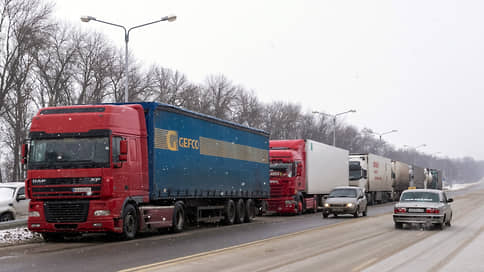At the border, the trucks go gloomily – Newspaper Kommersant No. 35 (7480) from 03/01/2023
[ad_1]

The list of products, ingredients and non-food items that do not require transfer from European trucks to Russian ones at the border may be drastically reduced. A meeting on this issue is planned for March with First Deputy Prime Minister Andrey Belousov. Participants in the food market fear damage to goods and rising prices, but logistics companies see potential in greater loading of infrastructure and local carriers.
The government of the Russian Federation will consider the issue of reducing the list of goods that are not subject to the ban on transportation by European trucks. This was told by two sources of Kommersant among food manufacturers. According to them, the topic will be discussed with First Deputy Prime Minister Andrei Belousov. Kommersant’s secretariat confirmed that a meeting on the issue is scheduled for March.
The ban on road freight transportation in the Russian Federation for companies from the EU countries, the UK, Norway and Ukraine has been in effect since October 10, 2022. The delivery of such goods is carried out by Russian carriers, using re-hooking or reloading in the border areas. Late last year, the federal government extended the ban until June 30, 2023.
Today, restrictions do not apply to about 40 product groups, including animal products, plants, vegetables and fruits, nuts, cocoa, malt, starches, fats, acids, tobacco, alcoholic and non-alcoholic beverages, glass, pharmaceutical products, cosmetics.
According to one of Kommersant’s sources, the list could be reduced by 50%.
Andrei Belousov’s secretariat says that the list of goods can be determined after an analysis of existing practice and the positions of interested authorities. The Ministry of Transport and the Ministry of Agriculture did not provide comments.
A Kommersant source among food manufacturers emphasizes that overloading products and food raw materials threatens to violate the temperature regime, loss of quality, and can also invalidate veterinary or phytosanitary certificates. In addition, the recoupling will increase the cost of delivery by 15-17%, he says. The general director of the KBT customs broker, Yulia Shlenskaya, adds that the transfer leads to an increase in the cost of logistics and an increase in prices.
The Association of Confectionery Industry Enterprises ASKOND asked the Ministry of Agriculture to keep positions in the list that are not subject to reloading or are of critical importance, says Vyacheslav Lashmankin, Executive Director of ASKOND. For example, he points out, the list includes types of white chocolate that are transported in melted form and are not subject to reloading or repackaging. In addition, adds Mr. Lashmankin, the additional complication of logistics creates the risk that European ingredient producers will simply refuse to supply goods. Dmitry Leonov, deputy chairman of the board of Rusprodsoyuz, points out that it is necessary to keep all food positions in exceptions for the uninterrupted production of products and price containment. Director General of the National Union of Milk Producers Artem Belov says that the association is counting on keeping food groups on the list.
Chairman of the Presidium of the Association of Retail Companies (includes X5 Group, Magnit, Lenta, Auchan, etc.) Igor Karavaev adds that a stable regime for the supply of essential goods, including non-food items, is important, since the categories are in high demand and consumers are highly price sensitive. RNC Pharma Development Director Nikolai Bespalov says that almost all drugs are transported by road, so restrictions may affect delivery times and prices.
Evgeny Dyatlov, head of the procurement department for international transportation at FM Logistic, points out that the company has inspected all border customs and logistics terminals and sees that the infrastructure is ready to increase the delivery of goods with reloading. According to him, now the workload of the terminals is “extremely low” and the initiative will have a positive impact on the infrastructure and Russian carriers.
[ad_2]
Source link





